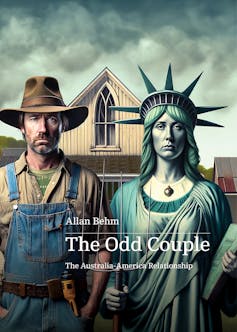Australia fears being abandoned by America – but do the two countries need each other?
- Written by Frank Bongiorno, Professor of History, ANU College of Arts and Social Sciences, Australian National University

In any presidential year, the Australian media – including social media – will suddenly generate a vast army of instant experts on American politics, all with a take you just have to read or hear. They’ll cover everything from laws governing electoral delegates in Arizona to the impact of demographic change on voting patterns in western Pennsylvania. In the 2024 US presidential year, when so much is at stake, that ramps right up.
Allan Behm’s The Odd Couple[1], a study of the Australia–America relationship that also serves as a meditation on both countries, could hardly be more timely. It belongs to a rather different tradition than that of instant analysis with newly acquired (and dubious) “expertise”.
The Odd Couple: The Australia–America Relationship – Allan Behm (Upswell)
Behm is a considered and reflective commentator. An experienced former diplomat, public servant and (Labor) political adviser who now works at the Australia Institute, he is qualified to offer both well-informed critique and constructive suggestions for the relationship.
He has a way with words and is widely read, displaying a formidable cultural range that can take in the Argonauts[2], Davy Crockett[3] and the Lone Ranger[4], the foundational documents of the United States, novels and poems from the 19th century, big thick books of political history and international relations, and much in between.

















